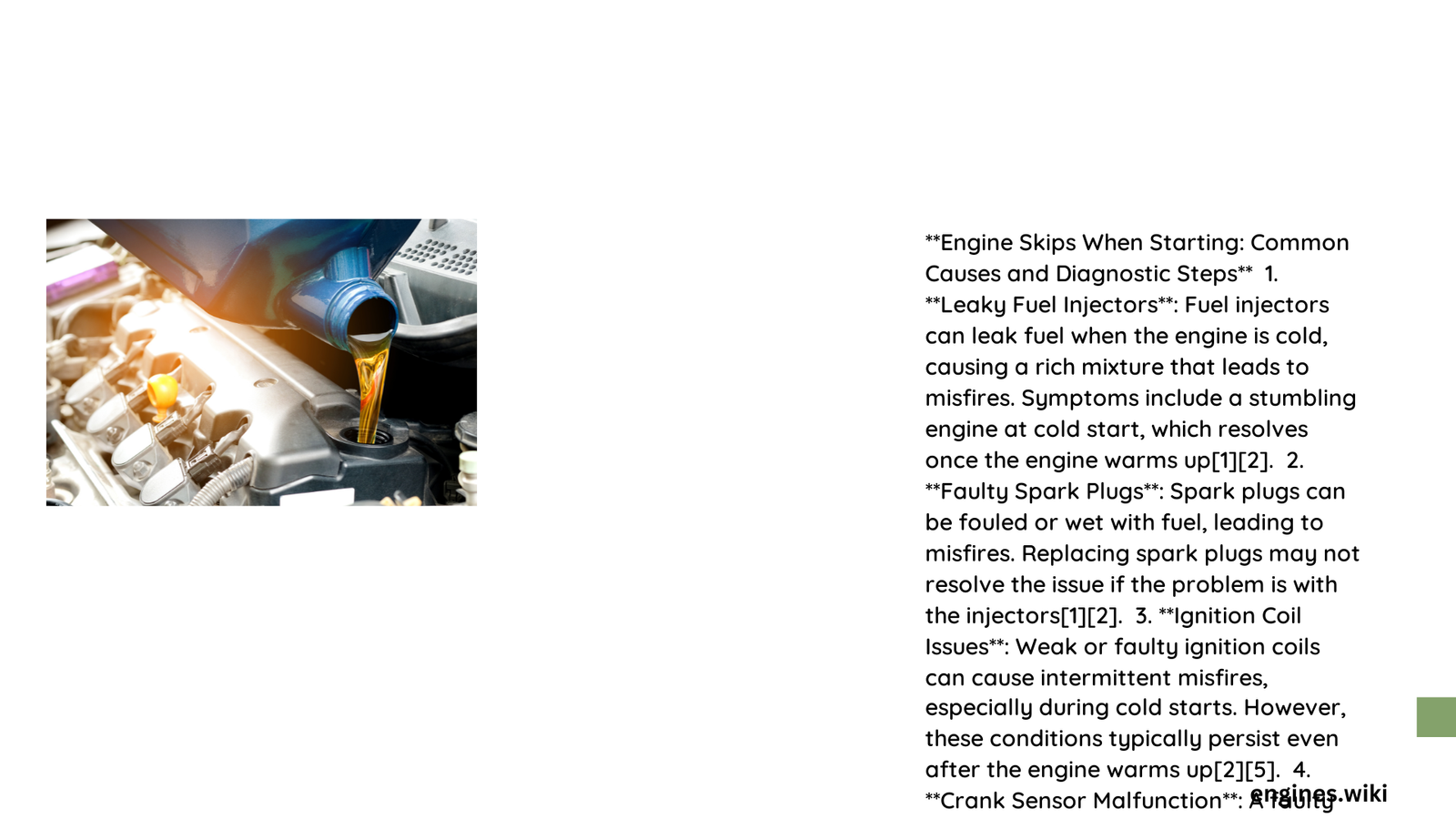When an engine skips during startup, it signals potential critical mechanical or electrical problems that can compromise vehicle performance and reliability. These interruptions might stem from complex issues within the ignition, fuel delivery, or compression systems, requiring systematic diagnostic approaches to identify and resolve underlying causes effectively and prevent potential long-term damage to your vehicle’s powertrain.
What Causes Engine to Skip During Startup?
Why Do Mechanical Failures Trigger Engine Skips?
Mechanical failures represent significant contributors to engine skipping during startup. These issues fundamentally disrupt the precise combustion process required for smooth engine operation.
Key Mechanical Failure Indicators
- Cracked cylinder head
- Compromised head gasket
- Damaged engine block
- Worn piston rings
- Reduced cylinder compression
| Mechanical Issue | Potential Impact | Diagnostic Complexity |
|---|---|---|
| Cylinder Damage | High Performance Reduction | Advanced |
| Compression Loss | Inconsistent Engine Startup | Moderate |
| Piston Ring Wear | Reduced Fuel Efficiency | Intermediate |
What Electrical Problems Contribute to Engine Skipping?
Electrical system malfunctions can dramatically interrupt the engine’s startup sequence, causing unpredictable performance.
Critical Electrical Components
- Spark plug functionality
- Ignition coil integrity
- Crankshaft Position (CKP) sensor performance
- Wiring harness condition
- Engine Control Unit (ECU) responsiveness
How Do Fuel System Issues Affect Engine Startup?
Fuel system complications can prevent proper air-fuel mixture delivery, resulting in engine skipping during startup.
Fuel System Diagnostic Checklist
- Fuel injector cleanliness
- Fuel pump efficiency
- Fuel filter condition
- Fuel pressure regulation
- Oxygen sensor functionality
What Diagnostic Steps Should You Take?
Essential Diagnostic Tools
- Professional-grade OBD-II scanner
- Multimeter
- Compression testing kit
- Fuel pressure gauge
- Visual inspection equipment
Systematic Troubleshooting Process
- Retrieve Diagnostic Trouble Codes (DTCs)
- Connect OBD-II scanner
- Record and analyze error codes
-
Identify specific misfire locations
-
Perform Comprehensive System Inspection
- Check electrical connections
- Examine spark plug condition
- Verify fuel system components
- Test compression levels
What Repair Strategies Resolve Engine Skipping?
Targeted Repair Approaches
- Spark plug replacement
- Ignition coil restoration
- Fuel injector cleaning/replacement
- Compression system repair
- Comprehensive system diagnostics
Cost and Time Considerations
| Repair Type | Average Cost | Estimated Time |
|---|---|---|
| Spark Plug Replacement | $50-$250 | 1-2 hours |
| Ignition Coil Repair | $150-$400 | 2-3 hours |
| Fuel System Service | $200-$600 | 3-5 hours |
| Major Engine Repair | $1,000-$4,000 | 8-40 hours |
Preventive Maintenance Recommendations

- Regular scheduled maintenance
- Timely component inspections
- Use high-quality fuel and lubricants
- Address warning signs immediately
- Follow manufacturer’s service guidelines
Professional Consultation
While DIY diagnostics can be helpful, complex engine skipping issues often require professional automotive technician expertise. Certified mechanics possess advanced diagnostic tools and specialized knowledge to accurately identify and resolve intricate engine performance problems.
Final Insights
Engine skipping during startup represents a complex mechanical challenge requiring systematic, methodical investigation. Understanding potential causes, implementing thorough diagnostic procedures, and maintaining proactive maintenance strategies can significantly enhance vehicle reliability and performance.
